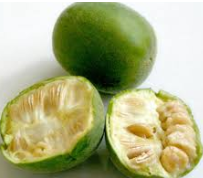The active compounds of stevia are steviol glycosides (mainly stevioside and rebaudioside), are heat-stable, pH-stable, and not fermentable.[4] Stevia’s taste has a slower onset and longer duration than that of sugar, and some of its extracts may have a bitter or licorice-like aftertaste at high concentrations.
Despite centuries of use, Stevia is not considered safe by the FDA:
“The plant commonly known as Stevia contains steviol glycosides, which are used as sweeteners. If food ingredients, such as sweeteners, are generally recognized as safe (“GRAS”), they do not require FDA approval as a food additive. Based on its review of information and data submitted by industry in GRAS notices submitted to FDA, FDA has not questioned the GRAS status of certain high-purity steviol glycosides for use in food. These high-purity steviol glycosides may be lawfully marketed and added to food products sold in the United States. However, stevia leaf and crude stevia extracts are not considered GRAS and do not have FDA approval for use in food.”
What are the benefits of stevia?
Pros
- Stevia sweeteners don’t have calories and are a good choice for people trying to lose weight.
- They generally don’t raise blood sugar levels, so they’re a good sugar alternative for people with diabetes.
- They’re available in liquid, granule, and powder forms.
What are the disadvantages of stevia?
Cons
- Sweeteners with stevia are more expensive than sugar and most other artificial sweeteners.
- It may cause side effects such as bloating, nausea, and gas.
- Stevia has a licorice flavor and somewhat bitter aftertaste.
- It may cause allergic reaction. If you’re allergic to any plant from the Asteraceae family such as daisies, ragweed, chrysanthemums, and sunflowers, you shouldn’t use stevia.
- It may be blended with higher-calorie or higher-glycemic sweeteners which occurs often in the US. You have to check the label to be sure it is pure or grow the plant yourself.
- Examples:
- Most stevia products are highly refined.
What is monk fruit?
What are the benefits of monk fruit?
Pros
- Sweeteners made with monk fruit don’t impact blood sugar levels.
- With zero calories, monk fruit sweeteners are a good option for people watching their weight.
- Unlike some artificial sweeteners, there’s no evidence to date showing that monk fruit has negative side effects.
- They’re available in liquid, granule, and powder forms.
- They’re safe for children, pregnant women, and breast-feeding women.
- According to a 2009 study, monk fruit gets its sweetness from antioxidant mogrosides. The study found monk fruit extract has the potential to be a low-glycemic natural sweetener.
- A 2013 study concluded mogrosides may help reduce oxidative stress. Oxidative stress may lead to disease. Although it’s unclear how specific monk fruit sweeteners come into play, the study shows monk fruit’s potential.
What are the disadvantages of monk fruit?
Cons
- Monk fruit is more expensive as it is more difficult to grow.
- Monk fruit sweeteners can be harder to find than other sweeteners, but is of course available on Amazon: https://amzn.to/2LgtkhL
- Not everyone likes monk fruit’s fruity taste: there can be an unpleasant aftertaste.
- Some monk fruit sweeteners contain other sweeteners such as dextrose. Depending on how the ingredients are processed, this may make the end product less natural. This may also impact its nutritional profile.
- Mogrosides may stimulate insulin secretion. This may not be helpful for people whose pancreas is already overworking to make insulin.
- They haven’t been on the U.S. scene very long. They’re not as well studied in humans as other sweetener
What is the Best Sweetener for Me?
- Refined sugar is considered a poison by some doctors for diabetics and even for all patients. Excessive sugar intake is associated with diabetes, chronic inflammation, and alzheimer’s disease.
- Weaning oneself off sugar can be tough if not impossible in some cases.
- Try a gradual process.
- Ask yourself:
- When do I absolutely need a sugar rush and can I trick my brain into adjusting to Stevia or Monk fruit sugar? Do I need it for my morning coffee or at the end of long days?
- Am I diabetic or have a family history of diabetes?
- Will the taste of one drive me crazy?
- Can I afford the extra expense? Know that the expense of developing diabetes and all its consequences is much higher than Stevia or Monk fruit in general.
Take Home Message:
So we have started to grow Stevia at home.
Stevia and Monk fruit sweeteners are more natural choices than artificial sweeteners containing aspartame, saccharine, sucralose (ie, Splenda) and other synthetic ingredients.




 vs
vs


